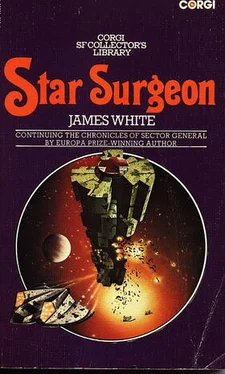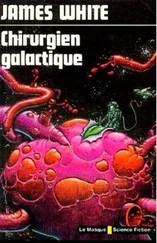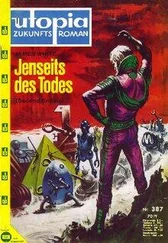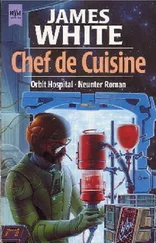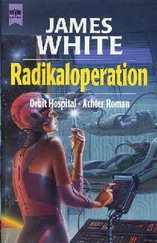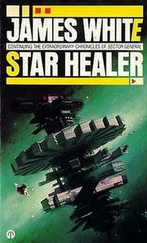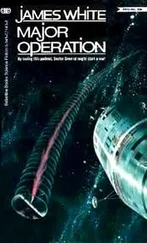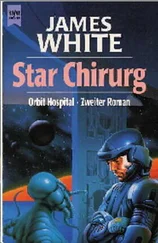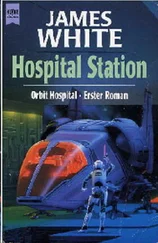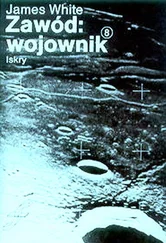He remembered a sudden impairment of vision then, and a shock of surprise when he realized that he was crying. Tears weren’t a conditioned medical reflex, he knew, because doctors just did not cry over patients.
Probably it had been a combination of anger at losing the patient-who really should not have been lost-and his extreme fatigue. And when he’d seen the expressions of all the patients watching him, Conway had felt horribly embarrassed.
Now the events around him had taken on a jerky, erratic motion. His eyes kept closing and several seconds, or minutes, passed before he could force them open again even though to himself no time at all went by. The walking wounded-patients with injuries which allowed them to move about the ward and return quickly to their tents in the event of a puncture-were moving from bed to bed doing the small, necessary jobs, or chatting with patients who couldn’t move, or hanging like ungainly shoals of fish while they talked among themselves. But Conway was always too busy with the newly-arrived patients, or too confused with a multiplicity of tapes, to chat with the older ones. Mostly, however, his eyes went to the sleeping figures of Murchison and the Kelgian who floated near the entrance to the ward.
The Kelgian hung like a great, furry question mark, now and then emitting the low moaning sound which some DBLFs made when they were asleep. Murchison floated at the end of a snaking, ten-foot safety line, turning slowly. It was odd how sleepers in the weightless condition adopted the fetal position, Conway thought tenderly as he watched his beautiful, adult girl baby swaying at the end of an impossibly thin umbilical cord. He desperately wanted to sleep himself, but it was his spell on duty and he would not be relieved for a long time-five minutes maybe, or five hours, but an eternity in either case. He would have to keep doing something.
Without realizing he had made a decision he found himself moving into the empty storeroom which housed the terminal and probable terminal cases. It was only here that Conway spared himself the time to chat, or if talking was not possible to do the essential and at the same time useless things which help to comfort the dying. With the e-ts he could only stand by and hope that the shattered, bloody wreckage of the Tralthan or Melfan or whatever would be given a tiny flash of Prilicla’s emphathetic faculty so that they would know he was a friend and how he felt.
It was only gradually that Conway became aware that the walking wounded had followed him into the room, together with patients who had no business being outside their tents who were being towed by the others. They gathered slowly around and above him, their expression grim, determined and respectful. Major Stillman pushed his way to the front, awkwardly, because in his one good hand he carried a gun.
“The killing has got to stop, Doctor,” Stillman said quietly. “We’ve all talked it over and that’s what we decided. And it’s got to be stopped right now.” He reversed the weapon suddenly, offering it to Conway. “You might need this, to point at Dermod to keep him from doing anything foolish while we’re telling him what has been going on …
Close behind Stillman hung the mummified shape of Captain Williamson and the man who had towed him in. They were talking to each other in low voices and the language was both foreign and familiar to Conway. Before he could place it the patients all began moving out again and he noticed how many of them were armed. The weapons had been part of the spacesuits they had worn, and Conway had not thought about guns when he had piled the suits into a ward storage space. Dermod, he thought, would be very annoyed with him. Then he followed the patients out to the main ward entrance, and the corridor which led to Reception.
Stillman talked nearly all the time, telling him what had been happening. When they were almost there he said anxiously, “You don’t think I’m … I’m a traitor for doing this, Doctor?”
There were so many different emotions churning inside Conway that all he could say was “No!”
He felt ridiculous pointing the gun at the Fleet commander, but that had seemed to be the only way to do this thing. Conway had entered Reception, threaded his way through the officers around the control desks until he had reached Dermod, then he had held the gun on the Fleet commander, while the others came in. He had also tried to explain things, but he wasn’t doing a very good job.
… So you want me to surrender, Doctor,” said Dermod wearily, not looking at the gun. His eyes went from Conway’s face to those of some of the Corpsmen patients who were still floating into the room. He looked hurt and disappointed, as if a friend had done a very shameful thing.
Conway tried again.
“Not surrender, sir,” he said, pointing at the man who was still guiding Williamson’s stretcher. “We … I mean, that man over there needs a communicator. He wants to order a cease fire …”
Stammering in his eagerness to explain what had happened, Conway started with the influx of casualties after the collision between Vespasian and the enemy transport. The interiors of both ships were a shambles and, while it was known that there were enemy as well as Corpsmen injured, there had never been time or the staff available to separate them. Then later, when the less seriously injured began to move around, talking to or helping to nurse the other patients, it became plain that almost half of the casualties were from the other side. Oddly this did not seem to matter much to the patients, and the staff were too busy to notice. So the patients went on doing the simpler, necessary and not very pleasant jobs for each other, jobs which just had to be done in a ward so drastically understaffed, and talking …
For these were Corpsmen from Vespasian, and Vespasian had been to Etla. Which meant that its crew were variously proficient in the Etlan language, and the Etlans spoke the same language as that used all over the Empire-a general purpose language similar to the Federation’s Universal. They talked to each other a lot and one of the things they learned, after the initial caution and distrust had passed, was that the enemy transport had contained some very high officers. One of the ones who had survived the collision was third in line of command of the Empire forces around Sector General …
And for the last few days peace talks have been going on among my patients,” Conway ended breathlessly. “Unofficial, perhaps, but I think Colonel Williamson and Heraltnor here have enough rank to make them binding. —
Heraltnor, the enemy officer, spoke briefly and vehemently to Williamson in Etlan, then gently tilted the plaster encased figure of the Captain until he could look at the fleet commander. Heraltnor watched Dermod, too. Anxiously.
“He’s no fool, sir,” said Williamson painfully. “From the sound of the bombardment and the glimpses he’s had of your screens he knows our defenses are hammered flat. He says that his people could land now and we couldn’t do a thing to stop them. That is true, sir, and we both know it. He says his chief will probably order the landing in a matter of hours, but he still wants a cease fire, sir, not a surrender.
“He doesn’t want his side to win,” the Captain ended weakly. “He just wants the fighting to stop. There are some things he has been told about this war and us which need straightening out, he says …”
“He’s been saying a lot,” said Dermod angrily. His face had a tortured look, as if he was wanting desperately to hope but did not dare let himself do so. He went on, “And you men have been doing a lot of talking! Why didn’t you let me know about it …
“It wasn’t what we said,” Stillman broke in sharply, “it was what we did! They didn’t believe a word we told them at first. But this place wasn’t at all what they had been told to expect, it looked more like a hospital than a torture chamber. Appearances could have been deceptive, and they were a very suspicious bunch, but they saw human and e-t doctors and nurses working themselves to death over them, and they saw him. Talking didn’t do anything, at least not until later. It was what we did, what he did …!”
Читать дальше
